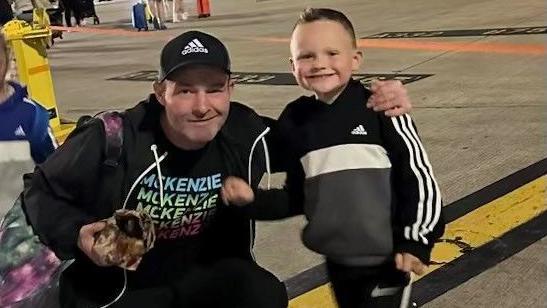Child let down by lack of support, say parents

Theo, pictured with dad Mark, has been waiting for an appointment to be assessed for autism for over three years
- Published
A family say their child, who they believe has autism, has been "massively" let down after he was unable to attend school for months at a time because of a lack of suitable support.
Theo Skelton, from Cumbria, is nearly six, but his parents say he cannot read or write, despite expressing a desire to learn.
His parents noticed he was displaying behaviour consistent with autism and sought a referral for assessment in January 2021, but more than three years later, they are still waiting for an appointment.
Cumberland Council emphasised its support for the family, while North Cumbria's NHS trust said it was "very sorry" for the time it was taking for Theo to get an assessment.
Theo's parents Mark Skelton and Natalie Davison, who live in Allonby, near Maryport, believe their son may have autism, ADHD and Pica, an eating disorder where a person compulsively eats non-food items.
While they wait for assessment, they have struggled to keep Theo in school since he started in September 2022, due to extreme delays in arranging the right support.
They are concerned he is missing out on his education, as well as on the opportunity to socialise with his peers.
'Worrying'
Mr Skelton said he felt the family had banged on every door for help.
"He's got us and that's it," he said. "We're not professionals.
"It's worrying when we're asking for help and we're just getting fobbed off.
"We're banging our heads on walls, it's all we're doing. The system as it is, is not fit for purpose.
"Theo has been massively let down, there is no doubt about that."
His mum added: "It's like they're waiting for something bad to happen."
'Craving' interaction
Mr Skelton said his son asked to learn to read and write and the parents were doing everything they could to help him, but it was also the interaction with other children that he needed.
"He keeps asking to go to Asda," he said, "because he made a friend at the checkout the other day and now he wants to go back.
"He's craving that interaction."
Shortly after joining Allonby Primary School in 2022, it became apparent that Theo had additional needs.
The parents were told the school could not cope with his behaviour, which included being disruptive, destructive and aggressive.
In February 2023, he stopped attending school while assessments were carried out and appropriate support put in place, but it was not until the following September that Theo could return to school with a one-to-one teacher.
And a month later, when the teacher left, alternative provision could not be arranged.
It means Theo has not attended school since October and the family are still waiting to hear how he may access education.
They are hoping he may now qualify for home-schooling support, but they do not know when this might be arranged.
'Deeply concerned'
Cumberland Council and Allonby Primary School responded jointly to the concerns raised by Theo's family, but said they could not comment on specifics related to the situation.
They said they had worked with partners to ensure all options were being considered and a further meeting was planned to discuss further options.
A spokesman said: "Education is vital for all children and young people’s development and well-being, and we appreciate the distress and upset families often experience if their child/young person cannot access this.
"It is always the intention of the council to ensure all children and young people are accessing a full and well-rounded education wherever possible, and we are very sorry the family feel let down in this circumstance."
The council added it was working to make education more inclusive and recently funding was allocated for a school for children who struggle in mainstream education.
Theo's parents are also unable to access any formal support while they wait for an assessment and diagnosis.
A spokesman for North Cumbria Integrated Care NHS Foundation Trust blamed unexpected delays, as as well as a significant rise in referrals.
They accepted waiting times for autism assessments for families were too long and were "deeply concerned" by this.
They said autism assessment could be extremely complex, especially for younger children.
"These assessments can take more than a year to complete. We must make sure our autism assessment is thorough, as this diagnosis stays with the child for life."
Follow BBC Cumbria on X (formerly Twitter), external, Facebook, external and Instagram, external. Send your story ideas to northeastandcumbria@bbc.co.uk.
- Published11 March 2024

- Published15 March 2024
